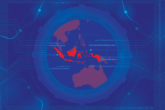September 22, 2022
Shift toward ‘Silicon Nation’ Promotes Resilience — for American Defense, Society and the Economy
Since World War II, Washington has mainly looked West for the latest innovations. The urgency to boost wartime production spurred R&D efforts outside the Pentagon. In particular, the Defense Department turned to universities like Stanford, which housed a wealth of untapped knowledge.
Soon home to many of the world’s leading technology companies, a myriad of venture capital and private equity funds, countless startup companies, and easy access to highly-educated talent, Silicon Valley — the renowned strip of land straddling the peninsula between San Jose and San Francisco — became a model for pursuing opportunity.
Better understanding by stakeholders of the national security and economic implications associated with robust S&T policies will drive additional incentives for pragmatic industrial policies like the CHIPS and Science Act.
Although it has long embodied the vast power and reach of America’s innovation capacity, Silicon Valley’s dominance appears to have peaked. States such as Tennessee and Idaho, and cities including New York City, Boston, Miami, and Austin have become so attractive for entrepreneurs that major tech companies have decided to relocate their headquarters. The list is growing and includes Tesla and even early Silicon Valley pioneer Hewlett-Packard Enterprise. Prominent venture capital firm Andreessen-Horowitz went as far as announcing its move to “the cloud,” to reflect a broader trend of talent dispersion driven by remote work.
Read the full article from The Hill.
More from CNAS
-
Siliconsciousness: The AI Competition: Public Policy Strategies: Part 1
This episode comprises the first part of our special event, “The AI Competition: Public Policy Strategies”. The event, co-hosted by MIT Technology Review, brings together some...
By Dr. ED McGrady
-
How Drones in Ukraine Are Reshaping War
Samuel Bendett, a senior adjunct fellow at the Center for a New American Security, joins The Cipher Brief to discuss the current situation of drones being used in Ukraine.Watc...
By Samuel Bendett
-
Countering the Digital Silk Road: Indonesia
This year marks the 10th anniversary of the Digital Silk Road (DSR), China’s ambitious initiative to shape critical digital infrastructure around the world to advance its geop...
By Vivek Chilukuri & Ruby Scanlon
-
How Secure Is America’s AI Advantage?
https://www.youtube.com/watch?v=7njJkH7XRa8...
By Paul Scharre



